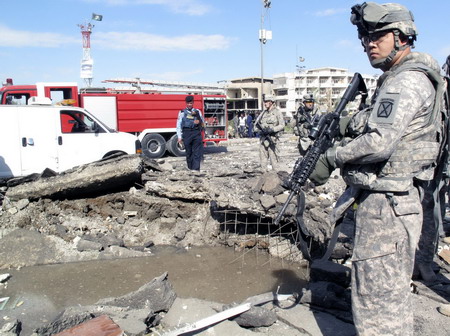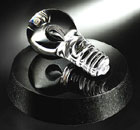Global General
Car bomb hits Baghdad police crime lab, 21 dead
(Agencies)
Updated: 2010-01-27 03:31
 |
Large Medium Small |
|
 A US soldier stands guard near a crater made by a bomb attack in central Baghdad January 26, 2010. A suicide blast killed at least 21 people at an Interior Ministry office in Baghdad on Tuesday, officials said, the latest attack to raise doubt about Iraq's ability to keep people safe weeks before national election. [Agencies] |
BAGHDAD: A suicide car bomber struck a police crime lab in central Baghdad Tuesday, killing at least 21 people and injuring dozens a day after suicide attacks hit several hotels favored by Western journalists, officials said.
The timing of the blast, a day after Iraq hanged Saddam Hussein's cousin and stalwart "Chemical Ali," prompted speculation that the latest attacks were retaliation by Sunni insurgents.
But the top American commander in Iraq, Gen. Raymond Odierno, said he saw "absolutely no connection" between the bombings Monday that killed at least 41 people and the execution. The US military did not have any immediate comment on Tuesday's bombing.
"We didn't turn Chemical Ali over until yesterday afternoon. ... There was no way anybody could have known about that," Odierno said Tuesday during a question-and-answer session with reporters in his office at Camp Victory, the sprawling US military headquarters on the outskirts of Baghdad.
This week's bombings highlight a pattern of increasingly large and well-planned attacks on high-profile targets in the capital. They began with coordinated suicide attacks in August against the Foreign and Finance ministries that killed nearly 100 people.
Since then, Baghdad has been hit repeatedly with major attacks every few months targeting government offices. On Monday, the targets shifted to hotels frequented by Western journalists and security contractors. Nearly 450 people have been killed in Baghdad since the August strike.
The execution of Ali Hassan al-Majid was likely to raise pre-election tensions between the Shiite-led government and minority Sunnis, who are already angered by a candidate blacklist they claim is being used as a political tool to undercut rivals. More than 500 names have been placed on the list for suspected links to Saddam's Sunni-dominated regime.
While there has been no formal claim of responsibility for the attacks at the hotels and against the Ministry of Interior offices, Odierno said it appeared to be the work of al-Qaida. Multiple bombings are a hallmark of the terror network.
Family members arrived in Baghdad to collect al-Majid's body for burial in the family hometown Tikrit later Tuesday, a day after he was hanged for atrocities such as the mass killing of Kurds in a poison gas attack in 1988 and other crimes against humanity.
Local authorities demanded a quick and simple burial without chanting or firing shots in the air as is common in Iraqi funerals, said an official, who spoke on condition of anonymity because he was not authorized to speak to media. The time of the burial was not made public.
In the Kurdish town of Halabja in northern Iraq, the scene of the 1988 poison gas attack that killed 5,000 people and cemented Chemical Ali's infamy, more than 400 Kurdish government officials and families who lost loved ones in the gassing defied the January chill to gather in a cemetery and at a monument to the victims.
"I am wondering which of my family's graves I would visit first to tell them about the death of Chemical Ali so they can sleep in peace," said Parvin Kamal Jalal, a 53-year-old woman who said she lost her parents and 12 other family members in the attack.
Rescue crews were combing through the rubble, looking for casualties of Tuesday's bombing. Officials say the majority of those killed were likely police officers who worked in the forensic investigation office at Tahariyat Square in the central neighborhood of Karradah. At least 82 people were reported injured.
Police and hospital officials said the bomber tried to drive a pickup truck through a checkpoint and blast walls protecting the forensic evidence office.
Among those confirmed killed were 12 police officers and some civilians visiting the office. Officials said more than half the wounded were police.
Rescue teams in blue jumpsuits combed through the debris of the partially damaged three-story building shortly after the blast as a crane removed some of the 10-foot, 7-ton concert blast walls toppled by the explosion.
The office targeted in the attack mainly dealt with data collected during criminal investigations, including fingerprints and other pieces of evidence. It is next to the Interior Ministry's major crimes office, which deals with terrorism cases.
Government offices have been frequent targets of major attacks in the capital since blasts struck the foreign and finance ministries in August, raising questions about the ability of Iraqi security forces to keep the country safe. While the criminal evidence offices have not been targeted by a major suicide bombing before, attackers have struck nearby.
The attack destroyed rooms on the ground floor of the building and damaged parts of the second floor. The office is surrounded by low-rise buildings with shops, takeaway restaurants and offices that were also damaged.
The toll from Monday's attacks continued to rise, with 41 people confirmed killed and up to 106 reported injured, police and health officials said Tuesday. All the officials spoke on condition of anonymity because they were not authorized to release details.
The bombings targeted the Sheraton Ishtar Hotel, Babylon Hotel and Hamra Hotel.










